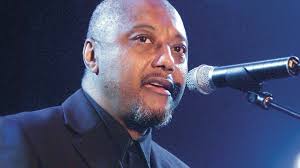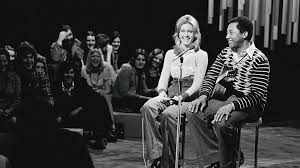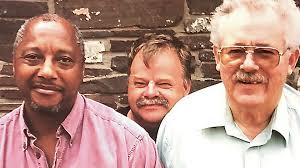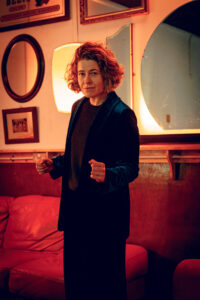Labi Siffre: ‘I’ve had far more difficulties in my life due to being a homosexual than being black’

Labi Siffre was born in June 1945 in Hammersmith. He formed his first band at 16 and began playing jazz guitar in groups around Soho in the late 60s. He released his self-titled debut album in 1970 and followed it up with classic albums including The Singer And The Song, Crying Laughing Loving Lying and For The Children. Hit singles in the 70s included It Must Be Love (later a hit for Madness), Crying Laughing Loving Lying and Watch Me.
A sabbatical from music ended in 1984, when Labi Siffre was inspired by a documentary about apartheid in South Africa to write Something Inside So Strong, a song that would reach No 4 in the UK chart on its 1987 release and go on to become an anti-apartheid anthem.
His music received a new lease of life in the 90s and 00s thanks to it being sampled by hip-hop artists, most notably when Eminem and Dr Dre used an instrumental element of Siffre’s 1975 track I Got The … as the hook for the 1999 global hit My Name Is.
Labi Siffre reflects on a youthful obsession with music, single-minded approach to life and what has been important to him:
At 16, I was trying to be Jimmy Reed. I’m the penultimate son of five boys and my brother Kole, who was five years older than me, was probably the largest influence on my life as a musician. He had an amazing record collection and still has excellent taste. So I grew up listening to the best of blues and modern jazz – Ornette Coleman, John Coltrane, Monk, Miles, Mingus, Howlin’ Wolf, John Lee Hooker, straight through to Ellington, Bird, Wes Montgomery, Oscar Peterson, Erroll Garner, Ella, the divine Sarah Vaughan, Mel Tormé, Little Richard, Fats Domino. That was the musical life that I grew up with, so I was very fortunate.
I’ve always been a serious person. At 14 I wrote my manifesto of what I was going to do with the rest of my life. It started with me thinking most people would do anything rather than evidence-based, critical thinking. Then I thought surviving is so tough for many millions, billions of people that perhaps they don’t have time for deep philosophical thought. I came to the conclusion that there was a group of people who took it upon themselves to think – as a duty, as a vocation – and those people would be philosophers and artists. I decided that I would be an artist-philosopher or a philosopher-artist. Somewhat to my surprise, it seems I stuck to my guns.

I was six the first time I saw a postcard in a window that said, “Room to let: No Blacks, no Irish, no dogs.” That was the first time I was trolled. I was brought up by the society I lived in. I was brought up to have very little self-esteem. I was brought up in a society that told me that as a man, I was supposed to be homophobic, racist, misogynistic and ableist. Because everywhere that I looked, that’s what I was being told was the right thing to be.
I gradually realised that everything I was being told about myself by the society and the country and the world I lived in, was a lie as a homosexual, Black atheist artist. So I decided that my roots had to start with me and I have progressed believing that ever since. I’ve never had time for people who base their lives on what their ancestors did. Especially when what their ancestors did was nothing to be proud of.
I decided very early on in my life that I would search for and find somebody, make them fall in love with me and we would live together happily ever after. I had decided that by the time I was 10 or 11 years of age. And I pursued that very seriously indeed. I doubt that there are even a handful of heterosexuals in the world who have considered this fact: while these things vary, only 6 or 7% of the population are homosexual and so it’s very much more difficult to find the person you want to spend the rest of your life with. You really have to take it rather more seriously.
I was very fortunate. In July 1964, I met Peter, who would have been my late husband had he lived long enough for marriage equality, so we were civil partners. Then in 1997, I met my husband Ruud. The three of us lived together for 16 years until Peter died in 2013 (we were together for 48 years). Ruud died in 2016. We were together for 19 years.
I have had far more difficulties in my life due to being a homosexual than being Black. And I conclude that your sexuality is who and what you are. And your colour is what other people say you are. If you are Black, you have to put up with the ignorance and arrogance of people who aren’t Black. If you are a homosexual, you must put up with the ignorance and arrogance of white people, blue people, green people, adult people, children who have been taught very early – just about every group of people.

I’d tell my 16-year-old self, if you want to grow up to be me, I shouldn’t give you any advice at all. But if I was to give advice – certainly from a musical point of view – I could say honestly, that had I known I was going to be as good as I was, I wouldn’t have given up so often. So possibly my advice would be, just keep doing what you’re doing.
Fame and fortune were not in my plan. Not for any high moralistic artistic reasons, it just merely never occurred to me. I wanted to be a musician. That was it. I wanted to be able to earn enough money so that I could be a musician all the time, rather than having to take day jobs. When I became a ‘public figure’, it took a very short time, a matter of a few months, for me to realise I was never going to be comfortable with that attention, but it was part of the job.
I know we’re supposed to pretend that we’re all glamorous. Well, I’m not. I am very work oriented. I’ve come to realise that my job satisfaction mainly comes from the making. As far as songwriting is concerned – as with writing novels, or whatever – it’s making something seemingly out of the shadow of nothing. If you manage to do it, you get a great deal of satisfaction that you’ve done a good job. And then of course, you’ve got to do the next one.
My real life was at home. That was the thing that was overwhelmingly the most important part of my life. The rest of it you could call it a fascination or obsession or an inability to get away from music and learning about it. During the early part of my career, probably by the second album, I was asking myself, why exactly am I doing this? Because I knew that I was not part of the mainstream. I started by saying, I’m trying to write good songs. And then I quickly thought, hang on a minute, that’s not a good enough explanation. And I came to the conclusion that I was attempting to write songs that are useful.
I don’t pat myself on the back. I find that very difficult. In fact, I spent the past few years telling myself to be more forgiving of myself. I would doubt that there is anyone more critical of me than I am. So I wouldn’t have been especially self-congratulatory when the songs I’ve written have made an impact and been useful to people. I wouldn’t have thought about it like that. I would have just got on with writing.

For 14 years, I was Peter’s 24/7 carer and I mean 24/7. During that period I probably spent, in total hours, less than two weeks working on music. And when I started to be able to function again, which is only a short while ago, I was very, very pleased to find that I’m still eager to learn. That’s one of the things about a career in music, or arts. It is constant learning.
My new material is me now, not me then. I’m still me and I know more now. At the moment, I’m doing the part of the job that is getting as much of me into the work as I can. I have no intention of trying to be somebody else. And once I’ve gone through that process, that’s when I go into the studio with other people who might do something I’ve done better, or have an idea that I haven’t had. The most important thing first of all though, is to get as much of me into the work as possible.
If I could go back to any time, that’s obvious. It’d be to when Peter and Ruud were alive. I’d say “I love you” and they’d say “I love you”. It would be very straightforward. And I would refuse to leave.
Labi Siffre’s catalogue is currently being reissued on vinyl by Demon Music Group. The latest in the series, 1973’s For the Children, was released on 26 April.

How to deal with the depression that hurts so many older LGBT+ people

Older LGBT+ adults have more health problems than their straight counterparts. Ageing gay men, lesbians, bisexual and transgender people have higher rates of diabetes, hypertension and disability than older straight adults. Mental health problems are also more prevalent. Social isolation and lack of family support might be the reason for these extra health problems.
It’s never easy writing about depression: it could be about a range of issues hitting at once such as finances, ageing, weight, looks, being single, the health of an elderly parent. It can be expressed as lethargy, disengagement or loss of interest.
Perhaps you can’t read the paper, stopped eating (then started binge-eating), have no interest in the gym or pastimes like the cinema or hanging out with friends. Your bed has become your best friend, the place where you can still sink into a pillow and dream, where you don’t need to dress or shower or fake interest or a smile.
Depression hits approximately 10 million people a year, and it’s estimated that 15 percent of the adult population will have an episode of depression during their lifetime. Gay men are three times more likely than the general population to suffer from depression. As such, we are also more prone to suicide.
Knowing the statistics about depression is helpful, acknowledging the illness, imperative, but what to do about it? That’s the next step. Seeking medical attention might be necessary, but you also need to fight from the inside – with a little help from your friends.
Depression often hits older people as careers have ended, they retire, they lose a partner and their sense of purpose goes away. There is often hopelessness that sets in.
It’s vital to open up about depression. As with all psychological illnesses, there tends to be a need to hide depression, to push it aside, to pretend we’re always as happy as our Facebook page might suggest. In the long run, denial only makes depression worse.
Even the smartest among us see depression as being weak, or ‘it’s just thoughts,’ or ‘just suck it up,’ or ‘it will pass.’ That’s just not true. It’s not simply ‘pull your thoughts together.’
Once you open up to people about your struggle, you’ll more than likely find they’ve experienced similar problems and are happy to share stories, offer advice, and lend an emotional hand. It’s therapeutic for both parties. You can keep your depression hidden behind a smile or embrace it as another part of you. But make sure you have social support. Social isolation isn’t just a symptom of depression; it’s a cause.

Monthly Queer Cabaret Night Hosted at The Met!
Thursday, 16 May 8.00pm – LOUD Cabaret – Bury Met
We’re delighted to announce a queer cabaret night where we will be showcasing the most fabulous of rising stars from across Bury and beyond.
May’s event will feature Holly Redford-Jones, Venn Smyth, and Evie D’Luca. Your host for the evening will be Mancunian writer, actor and activist Nathaniel J Hall, Artistic Director of Dibby Theatre. Thursdays have never been so exciting!


The event includes “I Was Dancing in the Lesbian Bar” by Holly Redford-Jones combining her three greatest passions: music, comedy, and lesbians, and Venn Smyth who blends synth, sax, ballads and bops.
Supported by The Greater Manchester LGBTQ+ Network and Dibby Theatre
£11 standard / £9 subsidised / £13 supporters (including fees)
Standard – What we need most people to pay.
Subsidised – For people currently unable to pay the standard price.
Supporters – The extra you pay goes directly towards the subsidised ticket option.
Doors open 7.00pm / first act on-stage 8.00pm
Book here

The article on depression will represent so many older LGBT plus people.
imagine repressing your sexuality for most of your life or you lose your long term partner.
Its never too late to come out. I was 69. Families or religious opinions stop some people.
I realised our life is not a rehearsal as we are the players. My life changed after coming out.
Yours can too, my friends.
LikeLike